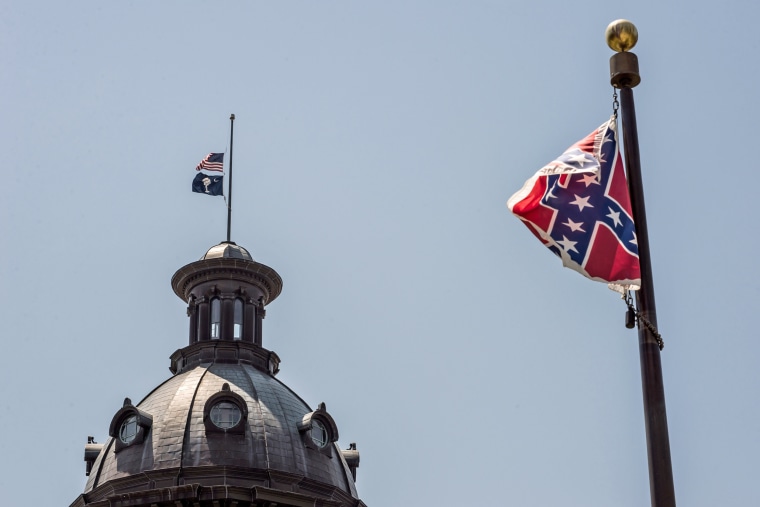The slaying of nine people at a historic black church in Charleston, South Carolina, by a white gunman has reignited one of the state’s most racially charged debates: taking down the Confederate flag for good.
Calls for the rebel banner’s removal at the statehouse have grown on social media after it was left to fly at full staff this week — even after two flags atop the capitol were lowered in honor of the victims.
South Carolina Gov. Nikki Haley has since suggested that it might be time to revisit the flag controversy again in "thoughtful words." But for many, the argument over whether to pull it permanently remains rooted in a deeper divide: Is it a symbol of Southern heritage or enduring hate?
State Rep. Christopher Hart told NBC News he gets emotional when he drives past the statehouse and sees the Confederate flag hoisted up high.
"You’re at the stoplight and you have to see it fly right at your face, and it’s disgusting," Hart said.

The Democratic lawmaker has tried repeatedly since he joined the General Assembly in 2006 to have the flag removed, but he said his bills don't even get out of subcommittee because of opposition from the Republican majority.
A previous push to get the Confederate battle flag scrubbed from the statehouse, where it's been since 1962, ended with a compromise in 2000. The flag was taken from the top of the capitol dome and placed elsewhere on the grounds at a Confederate war memorial.
The move came after the NAACP threatened the state with boycotts.
"I’m a product of the South. Who’s heritage is it? It’s not my heritage."
This time, the horrific murders at the Emanuel African Methodist Episcopal Church on Wednesday night have once again put a spotlight on the flag. The suspected shooter, Dylann Roof, drove a car bearing a license plate featuring the Confederate symbol.
After the shooting, the Confederate flag at the statehouse was left flying at full staff because the General Assembly is out of session, and state law requires any changes dictating how the flag is flown to be approved by the lawmakers. They would also have the authority on whether the flag is taken down permanently.
The General Assembly must wait until January to take up the issue again, said Antjuan Seawright, political adviser to the Senate Democratic Caucus.
RELATED: Hate Crime in America, by the Numbers
The Confederate controversy became a campaign issue last year, when Haley, a Republican, ran against Democratic Sen. Vince Sheheen for South Carolina governor. Sheheen held a news conference calling for the flag's removal in a state "too often separated by race, by region, by party."
Haley said at the time that the flag wasn't an issue, but she suggested during an interview Friday on "CBS This Morning" that "the state will start talking about that again." Her office didn't immediately respond to NBC News for comment.
Some prominent South Carolina politicians were outspoken on the issue Friday. U.S. Sen. Lindsey Graham, a Republican presidential candidate, said the problem is with the gunman, not the flag.
U.S. Rep. Mark Sanford, a Charleston Republican and former governor, said resurfacing the issue could end up being a "Pandora’s box."
But Seawright said he anticipates a "growing choir" demanding change. Such a movement could be bolstered by the Supreme Court ruling this week that Texas cannot be required to allow the Confederate flag on car license plates.
But across the country, a recent NBC News online survey conducted by SurveyMonkey found that Americans remain evenly divided over what the Confederate flag represents. About half of those surveyed see it as a symbol of racism, while the other half sees it as a symbol of Southern pride.
Lee Wilson, vice president of the Confederate Heritage Trust in South Carolina, which organizes Civil War reenactments, puts himself in the second camp.
"Our history and heritage is really important to us," Wilson said. The Civil War "is an event that happened. It was bad for a lot of people — whites and blacks died during the war between the states."
But South Carolinians such as Hart don't buy the heritage argument.
"I’m a product of the South. Whose heritage is it? It’s not my heritage. It’s not Southern to me," Hart said. "There were hundreds of black soldiers in the Civil War, but you don’t see black people walking around with Confederate flags now."
GALLERY: South Carolina in Shock After Church Shootings
Rep. James Clyburn, D-S.C., a prominent black member of Congress, told NBC News that South Carolina didn't have to be a battle ground over the battle flag — if a certain compromise had been reached in 2000 to place the Confederate flag at the backside of the capitol grounds. Still, he would like to see it taken down now.
"It's long past time, and I think that we ought to remove it," Clyburn said. "Not because of what happened in Charleston, because it has no place having any appearance of sovereignty."
